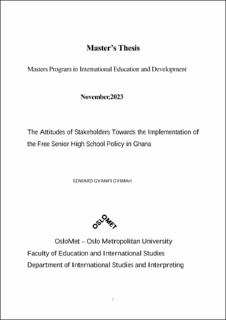The Attitudes of stakeholders Towards the Implementation of the Free Senior High school policy in Ghana
Master thesis
Published version
Permanent lenke
https://hdl.handle.net/11250/3121274Utgivelsesdato
2023Metadata
Vis full innførselSamlinger
Sammendrag
Since Ghana’s independence in 1957, several educational finance mechanisms, such as free education and fee payment modules, have been attempted with varying degrees of success. There is ample evidence that the cost of education and school-related costs at the family level has shattered and continues to shatter the educational prospects of many young people, particularly those from lower socio-economic origins. It was for this reason that the free compulsory basic education program (FCUBE) was implemented in recent decades. After the identification of such financing challenges at the senior high school level, the free senior high school policy was implemented in 2017 to replace the then-existing progressively free senior high school education. This study looks at the perspectives of many stakeholders (parents, teachers, and students) on the policy in terms of motives, advantages, challenges, and ideas for improving policy implementation. The study employed the qualitative research design, which helped obtain data from 40 stakeholders (students, parents, and teachers) in three senior high schools in the Ashanti Region of Ghana. The thematic analysis was used to analyze the data and reported using consolidated criteria for reporting qualitative research (COREQ). The study found that the introduction of the free senior high school policy was intended to relieve the financial burden of parents, especially guardians from rural settlements while increasing student enrolment, retention, and human development. So far, these aims have been accomplished and are being accomplished. However, several issues have saddled the policy’s implementation. Key among them are high enrolment rates culminated in teacher shortages, increased workload for existing teachers, classroom deficits, overcrowding in class, the double track system, a high rate of indiscipline, and inadequate teaching/learning materials. Furthermore, free feeding and lodging plagued schools with dissimilar glitches over dining and accommodation facilities. In view of the findings, the study recommends the expansion of infrastructure; adequate provision of learning materials; stakeholder support; the abolishment of the double track system, and improving the quality and quantity of meals provided to the students.
